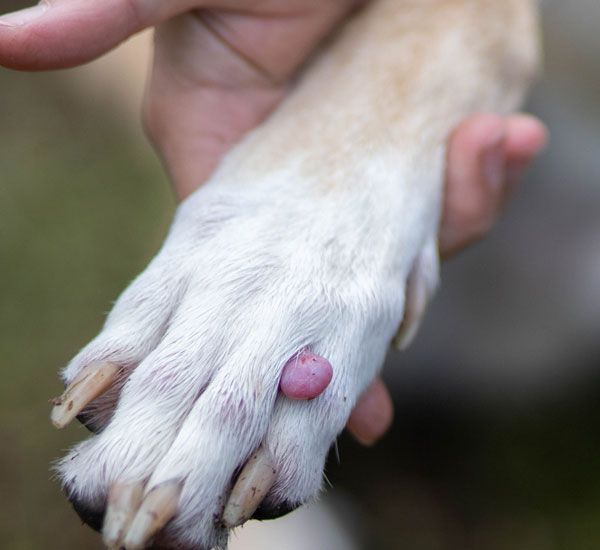Skin Cancer & Tumors in Pets
Skin cancer and tumors are serious conditions that can affect dogs and cats, sometimes with aggressive behavior or significant health consequences. Early detection and expert management by an animal dermatologist are crucial for the best outcomes. Veterinary dermatology specialists have the training and advanced diagnostic tools necessary to identify, diagnose, and treat skin cancers and tumors effectively.

What Are Skin Cancers and Tumors?
Skin tumors in pets can be benign (non-cancerous) or malignant (cancerous). While benign tumors may not spread or threaten health, malignant tumors can invade nearby tissues and metastasize (spread) to other organs.
Common types of skin tumors include:
- Mast cell tumors: One of the most common and potentially aggressive skin cancers in dogs.
- Squamous cell carcinoma: Often seen on sun-exposed areas, especially in light-colored or hairless pets.
- Melanomas: These tumors arise from pigment-producing cells and can be benign or malignant.
- Basal cell tumors: Usually benign and slow-growing.
- Fibrosarcomas and hemangiosarcomas: More aggressive tumors that affect deeper skin layers.
Signs and Symptoms of Skin Tumors
Early detection improves treatment success. Signs that your pet may have a skin tumor include:
- New lumps or bumps on the skin
- Ulcerated, bleeding, or crusty growths
- Rapidly growing masses
- Changes in size, shape, or color of existing lumps
- Persistent sores that do not heal
- Pain or discomfort when touching the area
If you notice any of these signs, prompt evaluation by an animal dermatologist is important.

How Are Skin Tumors Diagnosed?
Diagnosing skin tumors involves:
- Physical examination: Careful inspection and palpation of skin masses.
- Fine needle aspiration (FNA): Collecting cells from the lump for cytological analysis.
- Skin biopsy: The gold standard, where a tissue sample is taken for histopathology to determine the tumor type and grade.
- Advanced imaging: X-rays, ultrasound, or CT scans may be necessary to assess tumor spread (staging).
Accurate diagnosis guides treatment and prognosis.
Treatment Options for Skin Cancer & Tumors
Surgical Removal
Surgery is often the first line of treatment, aiming to completely remove the tumor with clean margins to reduce recurrence risk.
Radiation Therapy
For tumors that cannot be fully removed surgically or for certain types like mast cell tumors, radiation therapy helps control local disease.
Chemotherapy
Some malignant tumors respond to chemotherapy, either alone or in combination with surgery and radiation.
Targeted Therapies
Newer treatments, including tyrosine kinase inhibitors, are available for specific tumors like mast cell tumors, improving outcomes.
Supportive Care
Pain management, wound care, and nutritional support are important components of comprehensive cancer care.
Why Choose an Animal Dermatologist for Skin Tumors?
Animal dermatologists have specialized training in the diagnosis and management of complex skin tumors. Their expertise includes:
- Performing precise biopsies and advanced diagnostic tests
- Interpreting tumor grading and staging results
- Developing individualized treatment plans incorporating surgery, radiation, and medications
- Providing ongoing monitoring for recurrence or new tumors
Their comprehensive approach ensures the best possible quality of life for your pet.
Frequently Asked Questions (FAQs)
Can skin tumors in pets be prevented?
While some tumors are hereditary or related to sun exposure, early detection through regular skin checks is key to prevention of serious outcomes.
Are all lumps on my pet cancerous?
No, many skin lumps are benign. However, any new, growing, or changing lumps should be evaluated by a specialist.
How quickly should I seek treatment for a skin lump?
As soon as you notice a new or changing lump, schedule an evaluation to allow for timely diagnosis and treatment.
Is surgery always necessary?
Surgery is often recommended, but treatment depends on the tumor type, location, and overall health of your pet.
What is the prognosis for pets with skin cancer?
Prognosis varies widely depending on the tumor type, grade, and stage, as well as treatment options chosen. Early intervention generally leads to better outcomes.
Conclusion
Skin cancer and tumors are serious health concerns in pets that require expert diagnosis and specialized care. Animal dermatologists provide comprehensive evaluation and advanced treatments to manage these conditions effectively, helping pets live longer, healthier lives.
If you notice any suspicious lumps or skin changes on your pet, consult an animal dermatology specialist promptly. Early detection and individualized treatment are the cornerstones of successful care.


